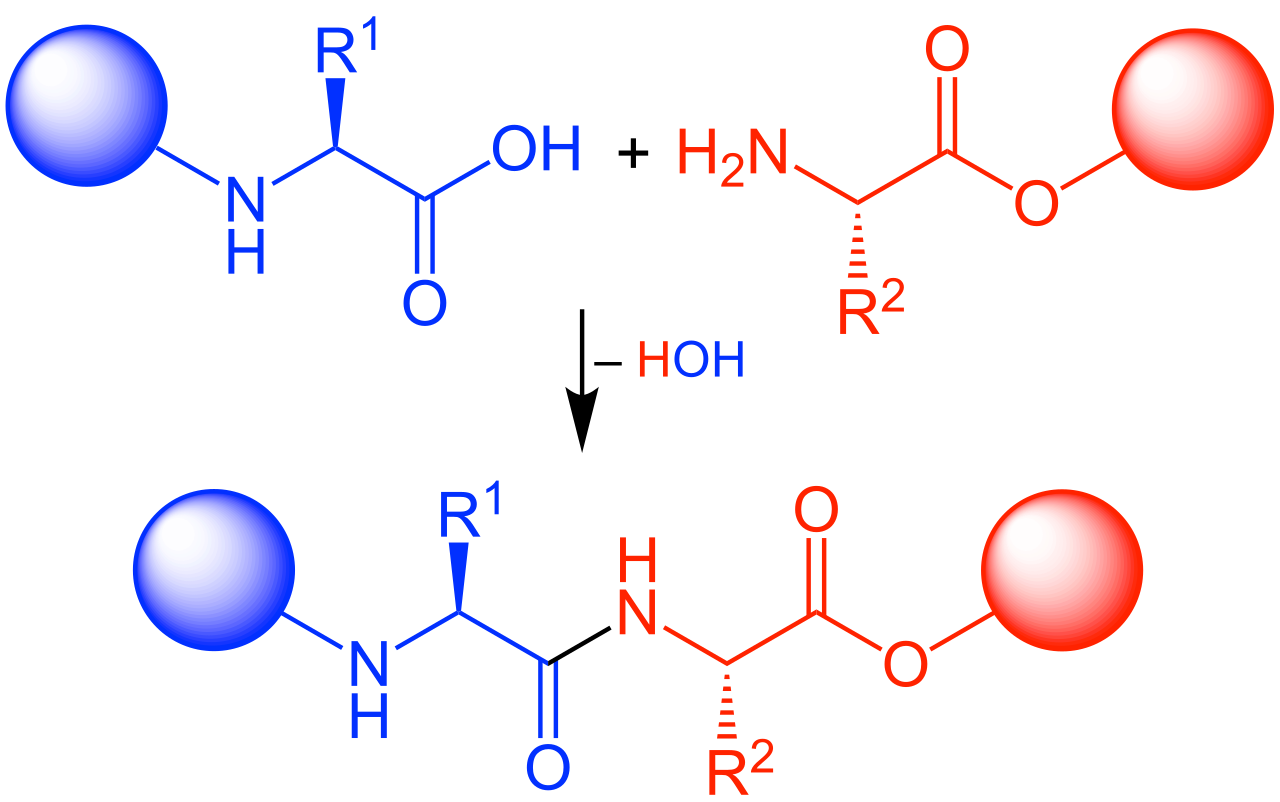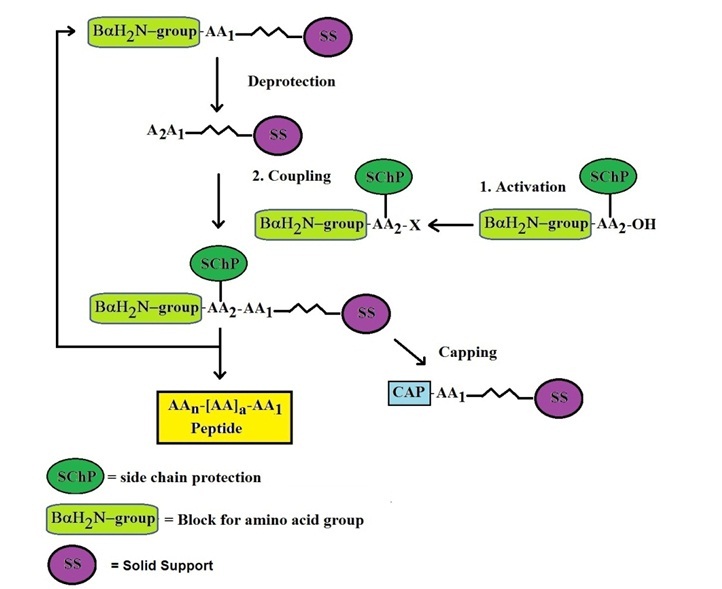Peptide Synthesis Service
- Drug Development: Providing essential peptide molecules for targeted drug development, particularly in vaccine research, antibody therapies, and related fields.
- Biomarker Screening: Synthesizing specific peptide markers to aid early disease diagnosis and biomarker discovery.
- Protein Interaction Studies: Peptides serve as key tools for exploring protein-protein interactions and their underlying mechanisms.
- Antibody Engineering: Used for antibody screening, specificity optimization, and antibody-peptide conjugation research.
- Basic Research: Providing research tools and materials for studies in cellular signaling, enzyme catalysis, immune responses, and other areas.
Peptide synthesis involves chemically linking amino acids in a specific sequence to create peptide chains. Peptides play critical roles in biological systems, participating in processes such as cell signaling, immune responses, and molecular recognition. By synthesizing specific peptides, we can simulate protein-protein interactions, study protein functions, and develop new drugs and vaccines. MtoZ Biolabs offers high-quality peptide synthesis service, including linear peptides, cyclic peptides, modified peptides, labeled peptides, and protein fragments, to meet the diverse needs of scientific research and the pharmaceutical industry, helping to drive innovation and breakthroughs in science.

Figure 1. Peptide Synthesis
Technical Principles
Peptide synthesis is primarily carried out using solid phase peptide synthesis (SPPS) technology. SPPS works by sequentially adding amino acids to a solid-phase carrier, where the amino acid’s carboxyl group is activated and reacts with the next amino acid to form a peptide bond. This process typically starts at the C-terminal of the peptide and progresses towards the N-terminal.
Protecting groups play a crucial role in peptide synthesis by preventing unwanted side reactions. Common protecting groups include Fmoc (9-fluorenylmethyloxycarbonyl) and Boc (t-butyloxycarbonyl). Fmoc-based peptide synthesis (Fmoc-SPPS) is widely used due to its efficiency, simplicity, and adaptability.

Figure 2. Scheme of SPPS on a Resin as Solid Support with Protected Amino Acids
Services at MtoZ Biolabs
1. General Linear Peptide Synthesis
We use state-of-the-art Fmoc-based peptide synthesis technology to create linear peptides ranging from small to long peptides, based on customer specifications. This method is accurate and efficient, widely used in drug development, vaccine research, antibody conjugation, and other applications.
2. Cyclic Peptide Synthesis
Cyclic peptides have a ring structure, which enhances their stability and biological activity. We offer cyclic peptide synthesis service to produce peptides with specific biological activities and targeted drug properties.
3. Modified Peptide Synthesis
We provide a range of peptide modifications, such as N-terminal acetylation (to enhance stability and biological activity) and C-terminal amidation (to improve solubility and stability). We also offer custom modifications such as phosphorylation, acetylation, glycosylation, and others to enhance peptide functionality.
4. Labeled Peptide Synthesis
For specific experimental needs, we offer peptide labeling services, including fluorescent and radioactive labeling, suitable for antibody detection, protein interaction studies, and other research applications.
5. Protein Fragment Synthesis
We also offer synthesis of longer protein fragments, capable of generating peptide complexes with multiple peptide chains. These services are ideal for vaccine development, antibody design, and high-level research.
6. Custom Peptide Synthesis
We provide customized peptide synthesis to meet your unique requirements. Whether it involves peptides with complex modifications, non-natural amino acids, cyclic peptides, or labeled peptides, we ensure high-quality synthesis for your needs.
Service Advantages
1. Efficiency & Precision: Utilizing advanced SPSS technology, we rigorously control each synthesis step, enhancing both accuracy and efficiency.
2. Diverse Options: We offer a wide range of peptide synthesis service including natural peptides, modified peptides, and cyclic peptides to meet different research needs.
3. Quality Assurance: Each peptide batch undergoes stringent quality control to ensure purity, yield, and biological activity.
4. Flexible Scales: We support both small-scale experimental synthesis and large-scale production to meet the needs of diverse customers.
5. Comprehensive Support: Beyond peptide synthesis, we also offer analysis, purification, solubility optimization, and other services to ensure your product meets the highest research standards.
Applications
Peptide synthesis technology has broad applications across various fields, and MtoZ Biolabs' peptide synthesis service support research and development in the following areas:
FAQ
Q1: How do you ensure the quality of peptide synthesis?
We strictly follow standard operating procedures during peptide synthesis, with quality control checks at each step. These checks include verifying the accuracy of the amino acid sequence, the purity of the peptide chain, and the yield and biological activity of the final product.
Q2: What impurities might be present in the peptide?
During peptide synthesis, impurities may include unreacted amino acids, incomplete peptide chains, and by-products formed during the synthesis process. We use efficient purification techniques (such as HPLC) to remove these impurities and ensure that the final peptide product has high purity.
Q3: Why perform N-terminal acetylation and C-terminal amidation modifications?
Chemically synthesized peptides typically have free amino and carboxyl groups at the N- and C-termini. To more closely mimic the natural state of peptides in the parent protein sequence, the peptide ends are often capped through N-terminal acetylation and C-terminal amidation. These modifications help reduce the peptide's net charge, lower its solubility, and better simulate the original state of the α-amino and carboxyl groups in the parent protein.
MtoZ Biolabs offers reliable peptide synthesis service to support your research and development goals. With our advanced SPPS technology, we ensure high-quality peptides tailored to your specifications. Our solutions are designed to facilitate progress in drug development, molecular studies, and biotechnology. Partner with us to advance your scientific innovations and achieve research success. Contact us today to learn more about how we can support your peptide synthesis needs.
How to order?







